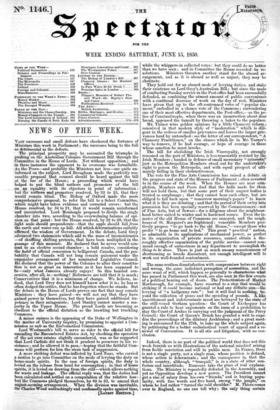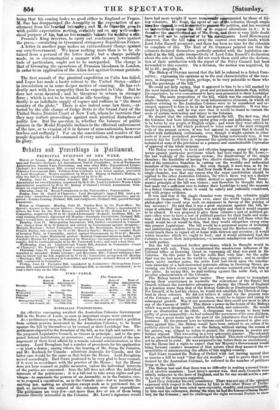Indeed, there is no part of the political world that
does not this week furnish us with illustrations of the national mischief arising from feeble conviction and will in public men. In France, there is not a single party, not a single man, whose position is defined, i
whose action s determinate ; and the consequence is, that the whole country, although "tranquil," is in a state of utter con fusion and incertitude. Rumours take the place of real explana- tions. The Ministry is repeatedly defeated in the Assembly, and yet no Opposition develops a new power. The President cannot get a rise of salary from his own "friends," and is buying popn- krity, with fine words and free hand, among "the people," on whom he had rather "turned the cold shoulder." M. Thiers comes over to England, no one can tell why; the only thing certain being that his coming bodes no good either to England or France. IL Sue has disappointed the Assembly in Ike expectation of ix- eitement from his bevdigt intesoityt and IL de tftarOn goes in with public expectation testing, Ge,tainlY NA on nar vell-undpr- stood impose of kik hut en his geissale %lasts fa &Wang 4, Air.
Prussia's Xing recovers, to can,r out reactionary laws against the press,—emulating in tyrannical stringency Republican France.
A letter in another page makes an extraordinary charge against our own Government. We know nothing more than is to be ob- tained from a perusal of the letter ; but a ohnrge publiy made, in so circumstantial a manner with so much verisimili- tude of particulars, ought not to be unregarded. The charge is tba,t of favouring the operations of Prussian bloodmen in London, iji uslor tq an application of the Alien Act against German patriets.



























